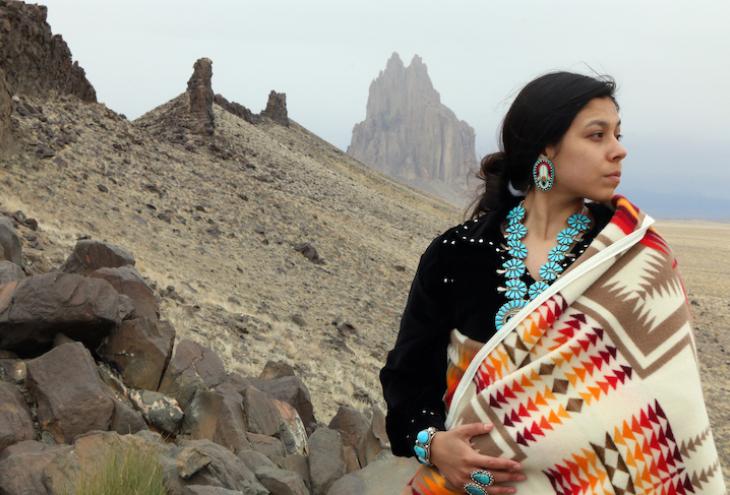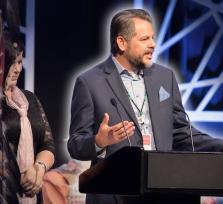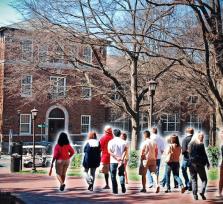Dominque Pablito grew up in the small town of Aneth, Utah, on the Navajo Nation, and in New Mexico on the Zuni Reservation. She lived in a four-bedroom house with 13 family members, sharing a bedroom with her mother and brother, and visited relatives for extended stays. “I spent time with my great-grandmother, whose house had no running water or electricity,” she says. Because her grandparents did not speak English, Pablito learned the Zuni and Navajo languages. Pablito says that her father, an alcoholic, came in and out of her life. “I spent time with his family in the Zuni Pueblo,” she says. “I love the connection that the Zuni have with the land and the spirits of the land.”
With access to math and science courses limited in reservation schools, Pablito convinced her family to move. “We ran out of gas in Saint George, Utah, where I registered for high school even though my family was unable to find housing,” she says. “During my first quarter at my new school, I slept in a 2008 Nissan Xterra with my mother, brother, and grandmother, while I earned straight As, took college courses at Dixie State University, and competed in varsity cross country.”
Pablito met her goal of graduating from high school in three years, racking up honors and college credits. “My mother told me I would have to excel in school to get a scholarship for college,” she says. “When I graduated at 15 with an excellent GPA, having taken college courses at night, and with exceptional ACT and SAT scores, I was sure I would earn the Gates Millennium Scholarship. It wasn’t enough.” To compensate, she applied for 15 scholarships, and was awarded 12, including the Larry H. Miller Enrichment Scholarship, a full ride.
For Pablito, the transition to college life was jarring. “It was the first time I had my own bed in my own bedroom,” she says. “I missed being so close to my Zuni culture. I brought small kachina figurines with me and did my best to decorate my room like my old homes.”
Despite her hard work in high school, Pablito was not prepared for college academics and sought help from tutors, professors, and TAs.“I spent late nights watching tutorials on YouTube,” she recalls. “College retention rates for Indigenous students are exceptionally low, so instead of going home for the summer, I sought out research internships and difficult coursework to keep busy.”
Academics were not her only challenge. “I started college at 15, and by age 16 I had no parents,” Pablito explains. “My mother was abusive, and we ceased contact. At 17, I was diagnosed with an adrenal tumor, which pushed my strength to its limits. I never felt more alone in my life.”
For support, she turned to her grandparents. “Hearing their voices speaking the languages I grew up with helped with my loneliness,” she says. “My grandfather didn’t allow me to drop out of college.”
Pablito also reached out to Indigenous student groups. “I joined AISES and the Hospital Elder Life Program (HELP), which connected me with community elders,” she says. “I tutored. I tutored students in math and science, and assisted in teaching Diné Bizaad (Navajo) to students who had never heard the language. Being a part of these communities has been crucial in my success.” She also credits her research internships with helping her discover her strengths. “I decided to major in chemistry when I participated in the PathMaker Research Program at the Huntsman Cancer Institute, where I used biochemistry to investigate DNA damage and repair in cancer cells,” Pablito says. “Dr. Srividya Bhaskara guided me through the world of research, helping me earn many awards and grants.”
In the lab Pablito learned the important lesson that failure is inevitable. “I began to think that science wasn’t for me, until I understood that failure is a part of research,” she says. “What matters is how you handle that failure.”
She had a different lab experience during an internship at Harvard Medical School and Massachusetts General Hospital. There she used targeted photoactivatable multi- inhibitor liposomes to induce site-specific cell damage in various cancer cells. “That’s where my research interest in cancer and molecular biology developed,” she says. “That internship taught me how to effectively present scientific data, and how important community can be for the success of Native students.”
Her interest in medicine stems from her childhood experience with the Indian Health Service. “Many of my elders distrusted going to doctors because most health care providers are white,” she explains. “My great- grandfathers’ illnesses could have been treated much better had they visited a doctor sooner. I will use my medical training to improve the care of elders on my reservation by integrating culture, language, and medicine.”
In addition to earning an MD in family medicine, Pablito plans to earn a PhD in cancer biology, and eventually open a lab on the Zuni Pueblo to expose students to research. “I want to spark an interest in STEM in future generations of Indigenous scholars,” she says. “I want to give them advantages I never had.”













